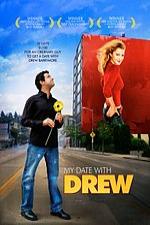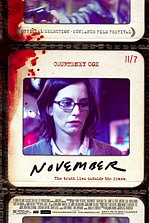

Knight at the Movies ARCHIVES

Dreams and Nightmares:
My Date With Drew, November
8-3-05 Knight at the Movies column
By Richard Knight, Jr.
The premise of the self-deprecating charmer My Date with Drew is simple enough: plucky nebbish Brian
Herzlinger wants to take out Drew Barrymore. Though he is out of work, has only a thousand dollars to his name
(which he won on a game show), and no personal connection to his intended, Brian, with the help of his friends, is
determined to get the date. Upping the ante, the trio of friends buy a video camera with a 30-day return guarantee
policy and take up the challenge of documenting their attempt to help Brian realize his dream before the camera
has to go back. It’s a gimmicky premise that would quickly wear out its welcome without the immense likeability
of Herzlinger and the continual inventiveness and comradeship that he and his friends share.
With that prologue, this breezy little documentary, (so friendly that it’s defined as “a film by Jon, Brian and Brett”)
takes off at a mad dash. From the start, Herzlinger has a huge amount of audience rapport and the film is endeared
– for the most part – by its brash yet naïve central subject. Though there’s lots and lots of talk about Barrymore,
however, we never really find out why our sweet underdog of a hero has such a thing for the elusive star to begin
with. Though he repeatedly worries about “the stalker effect” hampering his quest from coming to fruition, any
real lack of explanation for his fascination with her seems a bit odd. Beyond pointing out his initial crush on
Barrymore coming about because of E.T. (and who didn’t fall in love with cute little Gertie?), Herzlinger doesn’t
have anything else to say about the actress. He doesn’t talk about the adult Barrymore or liking her charming
performances in Ever After or Riding in Cars with Boys or even The Wedding Singer, not to mention more than a
passing interest in her private life.
Perhaps this is because Barrymore the actress and personality are not really the point. This is only surreptitiously
a film about her anyway. Herzlinger could be trying to get a date with Cameron Diaz or Demi Moore or the Queen
of England. It seems that any celebrity will do nicely as the movie’s really about Herzlinger and his friends and
their Light Bulb of an idea for a way to get noticed by the entertainment business they’re trying to break into.
Though the execution is padded out and the film sags badly at the halfway point (there’s lots of stuff about
Herzlinger’s large amount of body hair, for example) it perks up toward the end as more and more people are
enlisted to make the quest come true (including funny cameo appearances by Eric Roberts and Corey Feldman).
Documentaries this light and airy are rare (Trekkies was another) which is another reason to recommend it. And
the movie has a hilarious and rather touching payoff that makes the end worth the wait.
+++++++++++++++++++++++++++++++++++++++++++++++++++++++++++++++
November, a psychological drama starring Courteney Cox owes a heavy debt to Antonioni’s Blow-Up,
DePalma's Blow Out, and Polanski’s The Tenant. These are excellent antecedents but Greg Harrison, the editor-
director of November, while not exactly coming up with a worthy successor to those minor classics, at least
doesn't embarrass him self by borrowing too liberally from them. The film is being billed as a thriller but that dulls
its assets – workmanlike though they are. And it’s not bad to suggest that November is the sort of film that will
make its greatest impact on DVD.
Shot in a palette of gray, blue and black, the story centers on the fragile relationship between Sophie (Cox) and
Hugh (James LeGros), a couple recently reunited after Sophie has admitted to an affair. Late at night, driving
home from dinner, Sophie has a craving for something sweet and sends Hugh into one of those late night delis.
Moments later, while a Motown tune blares from the car radio where Sophie is waiting steps away, a botched
robbery leaves everyone in the store dead – including Hugh. But did Hugh really die? Sophie, who teaches
photography and advises her students, “You decide what goes into the frame and what stays out” is suddenly
freaked out when she comes across a series of photos of the robbery that seems to question just that.
As the film proceeds, we see, in David Lynch-Run Lola Run style, three different possible scenarios (unoriginally
titled, “Denial, “Despair,” and “Acceptance”) of the robbery-murder and its affect on the characters. The result is
a somewhat interesting story that’s mostly well acted. Cox does good work but is lazily saddled with a pair of
glasses to make her appear more serious. She is well matched by the always welcome LeGros and nicely
supported (thanks to Anne Archer and Nora Dunn). The whole thing lasts under 80 minutes and ends not a moment
too soon as these emotionally stunted characters are not folks that you’re going to want to spend much time with.
The evocative music score by Lew Baldwin is quietly effective.
My Date With Drew, November
8-3-05 Knight at the Movies column
By Richard Knight, Jr.
The premise of the self-deprecating charmer My Date with Drew is simple enough: plucky nebbish Brian
Herzlinger wants to take out Drew Barrymore. Though he is out of work, has only a thousand dollars to his name
(which he won on a game show), and no personal connection to his intended, Brian, with the help of his friends, is
determined to get the date. Upping the ante, the trio of friends buy a video camera with a 30-day return guarantee
policy and take up the challenge of documenting their attempt to help Brian realize his dream before the camera
has to go back. It’s a gimmicky premise that would quickly wear out its welcome without the immense likeability
of Herzlinger and the continual inventiveness and comradeship that he and his friends share.
With that prologue, this breezy little documentary, (so friendly that it’s defined as “a film by Jon, Brian and Brett”)
takes off at a mad dash. From the start, Herzlinger has a huge amount of audience rapport and the film is endeared
– for the most part – by its brash yet naïve central subject. Though there’s lots and lots of talk about Barrymore,
however, we never really find out why our sweet underdog of a hero has such a thing for the elusive star to begin
with. Though he repeatedly worries about “the stalker effect” hampering his quest from coming to fruition, any
real lack of explanation for his fascination with her seems a bit odd. Beyond pointing out his initial crush on
Barrymore coming about because of E.T. (and who didn’t fall in love with cute little Gertie?), Herzlinger doesn’t
have anything else to say about the actress. He doesn’t talk about the adult Barrymore or liking her charming
performances in Ever After or Riding in Cars with Boys or even The Wedding Singer, not to mention more than a
passing interest in her private life.
Perhaps this is because Barrymore the actress and personality are not really the point. This is only surreptitiously
a film about her anyway. Herzlinger could be trying to get a date with Cameron Diaz or Demi Moore or the Queen
of England. It seems that any celebrity will do nicely as the movie’s really about Herzlinger and his friends and
their Light Bulb of an idea for a way to get noticed by the entertainment business they’re trying to break into.
Though the execution is padded out and the film sags badly at the halfway point (there’s lots of stuff about
Herzlinger’s large amount of body hair, for example) it perks up toward the end as more and more people are
enlisted to make the quest come true (including funny cameo appearances by Eric Roberts and Corey Feldman).
Documentaries this light and airy are rare (Trekkies was another) which is another reason to recommend it. And
the movie has a hilarious and rather touching payoff that makes the end worth the wait.
+++++++++++++++++++++++++++++++++++++++++++++++++++++++++++++++
November, a psychological drama starring Courteney Cox owes a heavy debt to Antonioni’s Blow-Up,
DePalma's Blow Out, and Polanski’s The Tenant. These are excellent antecedents but Greg Harrison, the editor-
director of November, while not exactly coming up with a worthy successor to those minor classics, at least
doesn't embarrass him self by borrowing too liberally from them. The film is being billed as a thriller but that dulls
its assets – workmanlike though they are. And it’s not bad to suggest that November is the sort of film that will
make its greatest impact on DVD.
Shot in a palette of gray, blue and black, the story centers on the fragile relationship between Sophie (Cox) and
Hugh (James LeGros), a couple recently reunited after Sophie has admitted to an affair. Late at night, driving
home from dinner, Sophie has a craving for something sweet and sends Hugh into one of those late night delis.
Moments later, while a Motown tune blares from the car radio where Sophie is waiting steps away, a botched
robbery leaves everyone in the store dead – including Hugh. But did Hugh really die? Sophie, who teaches
photography and advises her students, “You decide what goes into the frame and what stays out” is suddenly
freaked out when she comes across a series of photos of the robbery that seems to question just that.
As the film proceeds, we see, in David Lynch-Run Lola Run style, three different possible scenarios (unoriginally
titled, “Denial, “Despair,” and “Acceptance”) of the robbery-murder and its affect on the characters. The result is
a somewhat interesting story that’s mostly well acted. Cox does good work but is lazily saddled with a pair of
glasses to make her appear more serious. She is well matched by the always welcome LeGros and nicely
supported (thanks to Anne Archer and Nora Dunn). The whole thing lasts under 80 minutes and ends not a moment
too soon as these emotionally stunted characters are not folks that you’re going to want to spend much time with.
The evocative music score by Lew Baldwin is quietly effective.
You can't always get what you want, or can you?

